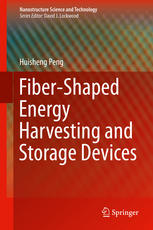

Most ebook files are in PDF format, so you can easily read them using various software such as Foxit Reader or directly on the Google Chrome browser.
Some ebook files are released by publishers in other formats such as .awz, .mobi, .epub, .fb2, etc. You may need to install specific software to read these formats on mobile/PC, such as Calibre.
Please read the tutorial at this link: https://ebookbell.com/faq
We offer FREE conversion to the popular formats you request; however, this may take some time. Therefore, right after payment, please email us, and we will try to provide the service as quickly as possible.
For some exceptional file formats or broken links (if any), please refrain from opening any disputes. Instead, email us first, and we will try to assist within a maximum of 6 hours.
EbookBell Team

5.0
110 reviewsThis comprehensive book covers flexible fiber-shaped devices in the area of energy conversion and storage. The first part of the book introduces recently developed materials, particularly, various nanomaterials and composite materials based on nanostructured carbon such as carbon nanotubes and graphene, metals and polymers for the construction of fiber electrodes. The second part of the book focuses on two typical twisted and coaxial architectures of fiber-shaped devices for energy conversion and storage. The emphasis is placed on dye-sensitized solar cells, polymer solar cells, lithium-ion batteries, electrochemical capacitors and integrated devices. The future development and challenges of these novel and promising fiber-shaped devices are summarized in the final part.
This book is the first to introduce fiber-shaped electronic devices, which offer many fascinating advantages compared with the conventional planar structure. It is particularly designed to review the state-of-art developments in fiber-shaped devices for energy conversion and storage. The book will provide a valuable resource for researchers and students working in a wide variety of fields such as advanced materials, new energy, electrochemistry, applied physics, nanoscience and nanotechnology, and polymer science and engineering.
Huisheng Peng, PhD, is a Professor and Associate Chair of the Department of Macromolecular Science and PI of the Laboratory of Advanced Materials, Fudan University, Shanghai, China.